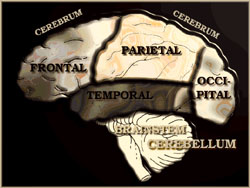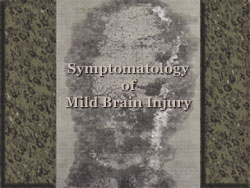Mild Brain Injury Symptoms
 There are many ways to categorize mild brain injury symptoms, with the most accepted in concussion cases to be a dichotomy between neurological and neurobehavioral. The problem we have with this distinction, is that it is based upon the assumption that certain symptoms have an organic cause and that the balance have a psychogenic cause.
There are many ways to categorize mild brain injury symptoms, with the most accepted in concussion cases to be a dichotomy between neurological and neurobehavioral. The problem we have with this distinction, is that it is based upon the assumption that certain symptoms have an organic cause and that the balance have a psychogenic cause.
We do not believe that most cognitive and emotional issues can be classified as strictly psychogenic, as they are the natural and expected consequence of a clear cut physical pathology, which in most concussion cases, is damage to neural connectors as a result of diffuse axonal injury. What is meant by this is damage to the cell that control the electrical part of the brain that tell each other what to do and how to respond. Further, we find that most symptoms are caused by an interplay of neurological, cognitive and emotional responses to such deficits and that headache and sleep disturbance cannot be pigeonholed into even these three categories.
 Cognitive
Cognitive
- Multi-Attending – Not being able to concentrate on two things at once. Problems paying attention or distracted easily. Trouble making decisions.
- Fatigue – Tiring easy or sleep issues. Fatigue that may enhance other deficits attributed to brain injury.
- Memory -Amnesia or short term memory loss. Having trouble remembering things like schedules or names and faces.
Emotional Issues
- Depression – Not being able to deal with the deficits atributed to brain injury. Also may cause listlessness and or becoming easily agitated.
Sleep Disturbance
Headache
- Post-Traumatic Migraine – Usually prescribed medications to ease the pain.
Focal Deficits
- Seizure – Anti-seizure medication is usually prescribed to control seizures.
- Vestibular and Cranial Nerve Symptoms – Symptoms that effect sense of smell, vision and taste issues.